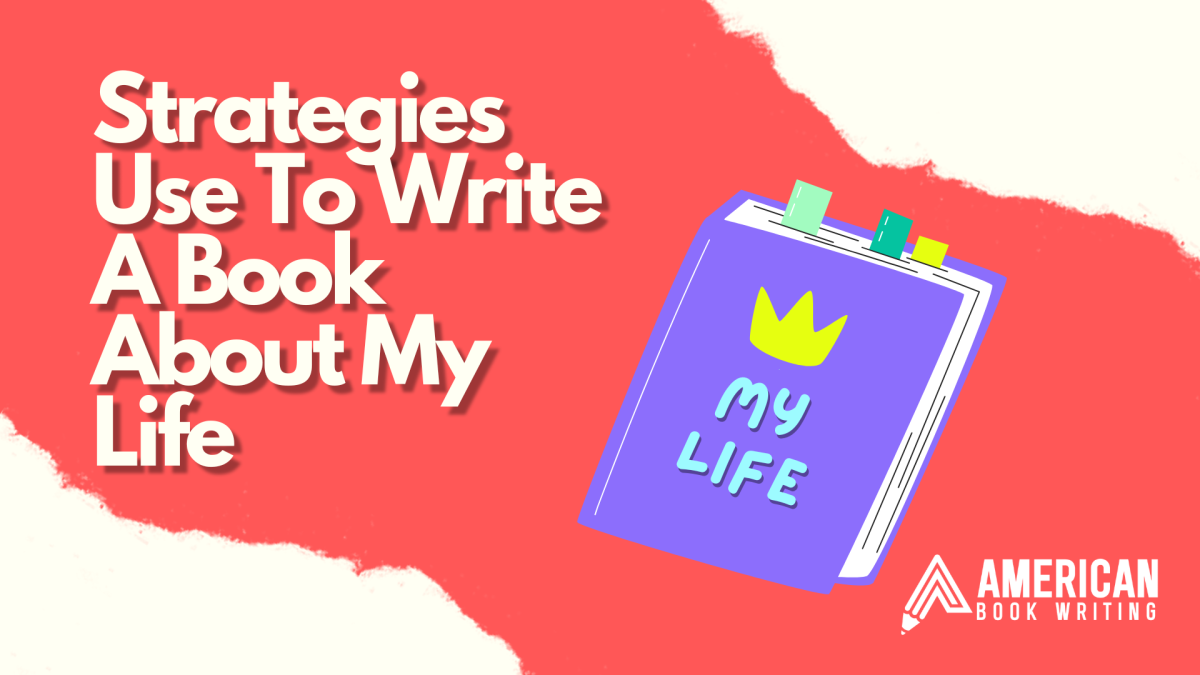Write a Book
Ever thought, “I should write a book about my life”? Or perhaps you’ve wondered if you can actually do it or even thought, “Maybe I want someone to write a book about my life because it seems too daunting.”
Whether aiming to pen it yourself or considering enlisting someone’s help like ghostwriters for hire, writing a memoir requires more than just recounting events. It involves sharing your experiences, emotions, and life lessons compellingly.
Here, I share thirteen strategies that have guided me through telling my life story.
1. Find Your Why:
Understanding the ‘why’ behind your desire to write a book about your life is like setting the foundation for a building. It holds everything else up and gives direction and purpose to your work. By identifying this core reason, you solidify your motivation and define the lens through which you want to tell your story.
How to Discover Your Why:
- Self-Reflection: Take a moment to sit quietly and reflect on what’s driving you to share your life story.
- Journaling: Write down your thoughts and feelings about your life’s significant events. This can often help you find patterns or themes that may not be immediately apparent, shedding light on your underlying motivations.
- Discuss with Loved Ones: Sometimes, discussing your ideas with someone close to you can offer new perspectives on why you want to write your life story. Their insights might help you understand your motivations more deeply.
2. Define Your Audience:
While your story is deeply personal, defining who you’re writing for can immensely shape how you tell it. Your intended audience influences your tone, the details you include, and how you frame your experiences. Understanding your audience helps you connect more profoundly, making your story heard and felt.
Once you’ve identified your audience, consider tailoring your narrative to engage them meaningfully. This doesn’t mean changing your story but highlighting aspects most relatable to their experience. For instance, focusing on emotional truths and commonalities that bridge your story to theirs can transform a personal memoir into a mirror reflecting shared human experiences.
3. Create a Memory List:
When deciding to write a book about my life, I quickly learned that relying solely on my memory to dictate the flow and content was insufficient. Creating a comprehensive memory list became an invaluable tool in this process. This list is essentially a collection of moments, big and small, that have shaped you and your journey. It serves as the backbone of your story, ensuring no significant event or emotion is overlooked.
Crafting Your Memory List:
- Brainstorming Sessions: Dedicate uninterrupted time to jot down every life event, milestone, interaction, or memory that feels significant. Don’t worry about order or importance at this stage; just let your thoughts flow freely.
- Include Varied Experiences: Capture many experiences, including triumphs, struggles, mundane moments, and pivotal decisions. These varied shades of life add depth and authenticity to your narrative.
- Emotional and Sensory Details: Alongside each memory, note how you felt and what senses were engaged. These details are crucial for bringing your story to life and allowing readers to walk in your shoes.
This memory list is not static; it will evolve and expand as you delve deeper into your writing process.
4. Choose a Structure:
Once you have your comprehensive memory list, the next step in the journey to write a book about your life is choosing its structure. This framework organizes your memories into a coherent and engaging narrative. There isn’t one right structure for everyone; it should reflect your unique story and how you want to tell it.
Exploring Different Structures:
- Chronological: For many, a chronological approach, following their life as it unfolded, feels most natural. This structure allows for a clear progression of time and events, giving readers a straightforward path through their experiences.
- Thematic: Maybe your life revolves around a few key themes or lessons. Organizing your book around these themes can offer a more focused insight into your growth and challenges.
- Pivotal Moments: Another approach centers your narrative around a few life-altering moments, exploring your life before and after these events. This structure can highlight change, resilience, and the impact of significant choices.
Deciding on Your Structure:
- Reflect on Your ‘Why’: Remember your core reason for writing this book. Which structure best aligns with the message or feeling you want to convey?
- Consider Your Audience: Keep your intended audience in mind. What structure might they find most engaging or relatable? How can you write a good story and present it in a way that speaks directly to them?
Choosing the right structure is pivotal, as it shapes how your story unfolds and readers experience your journey.
5. Set a Writing Schedule:
A structured writing schedule is a linchpin in writing a book about my life. It’s about making a commitment not just to the potential readers but to yourself and your story. Establishing regular writing intervals turns your vision into a tangible action plan, propelling your project from the realm of ideas into reality.
Implementing a Writing Schedule:
- Determine Your Best Writing Times: Reflect on when you feel most creative and least interrupted. It could be early mornings, late evenings, or specific days when you can dedicate uninterrupted time to writing.
- Set Achievable Goals: Whether it’s a certain word count or several pages per session, setting goals can help maintain momentum and measure progress.
- Consistent Effort Over Perfection: The aim here is consistency, not perfection. Writing regularly is more vital than the quantity produced in each session.
6. Write Without Censoring:
A common difficulty is, “Can I write a book about my life and capture the essence of my experiences?” Absolutely, but a pivotal step is to let your first draft unfold without self-censorship. This stage is about raw expression, getting everything that you want to say out on paper without worrying about how it’s articulated.
Embracing Unfiltered Writing:
- Ignore the Inner Critic: During initial drafts, silence the urge to criticize or correct your writing. Let your memories and emotions dictate your narrative.
- Free Writing: Allow yourself to write freely. If you’re stuck on one part of your story, move to another. This process is not about creating a masterpiece on the first go but laying down the essence of your experiences to mold and refine later.
- Stream of Consciousness: Implementing a stream-of-consciousness style can be particularly liberating. Write as thoughts come, without pondering too much on structure or coherence at this stage.
This unbridled approach can lead to profound insights and revelations about your life and how you wish to share it. It’s about prioritizing authenticity over accuracy in your first drafts.
7. Honor Your Emotions:
When you go on the journey to write a book about your life, you’re also setting out on an emotional exploration. Writing about personal experiences can stir deep emotions, some expected and others surprising. Honoring these emotions is essential; they are the heart of your narrative.
The emotional authenticity in your narrative is what will ultimately connect with your readers, making your story relatable and impactful. It validates the shared human experience, turning individual memories into universal truths.
8. Discover Your Unique Voice:
Finding the unique voice to tell your story is pivotal in writing a book about my life. Your voice is the medium through which your personality shines, imbuing your narrative with authenticity, depth, and relatability.
Your voice is your narrative signature; it distinguishes your story and connects with readers personally. Whether you’re penning the memoir yourself or pondering, “I want someone to write a book about my life,” ensuring the narrative carries your unique voice is essential for a genuine connection with your audience.
9. Revise and Edit:
Writing your life story is an ongoing process involving much more than just writing your memories down on paper. In the revision stage, your narrative shines, transforming from rough first drafts to a polished manuscript.
“Can I write a book about my life and make it engaging to others?” is a common doubt. Through revision, focusing on refining your story’s structure, language, and emotional truth, your narrative will engage and resonate deeply with readers.
10. Share Your Story:
After the strenuous yet fulfilling process of writing and revising your book, the final step is to share it. Whether you intend to publish a memoir just for family and friends, a self-help guide, or a commercially published autobiography, sharing your story is the culminating achievement of your journey.
For those who muse, “I want someone to write a book about my life,” it’s crucial to ensure the person you collaborate with understands the significance of sharing your story with authenticity and integrity. This journey from conception to sharing brings your narrative to life and can inspire, heal, and connect with others on a profound level.
11. Embrace the Uniqueness of Your Story:
The uniqueness of your story is what will make it stand out. “Can I write a book about my life that is different from others?” Yes, by delving into what makes your journey uniquely yours and emphasizing these elements, you create a narrative that offers new perspectives to readers.
How do you highlight your story’s uniqueness?
- Identify Unique Experiences: Reflect on the events and experiences that have shaped you. Even common themes can have unique outcomes or lessons that differentiate your story.
- Be Authentic: Authenticity resonates with readers. Being candid about your failings, triumphs, and lessons learned invites readers into your world.
- Incorporate Unique Elements: Consider incorporating elements like letters, diary entries, or photographs that can give readers a more intimate look into your experiences.
12. Prepare for Public Reaction:
Sharing your life story can be a vulnerable act, often sparking a wide range of public reactions. Preparation for this phase is crucial, especially when pondering, “I want someone to write a book about my life,” because how the story is received can impact you personally and professionally.
Handling Public Reaction:
- Anticipate Varied Responses: Be prepared for a spectrum of reactions. While many readers will be supportive and empathetic, others may critique or misinterpret your experiences.
- Stay Grounded in Your Why: Remember why you shared your story. Holding firm to your purpose can help you navigate through negative responses.
- Engage with Your Audience: Constructive engagement with readers can foster a community of support and further the impact of your narrative.
13. The Legacy of Your Words:
When embarking on the journey to write a book about my life, you must consider the legacy you wish to leave through your words. Your memoir can influence, inspire, and even change perspectives long after you’ve shared your story.
Whether charting the course alone or expressing, “I want someone to write a book about my life,” the contemplation of your narrative’s legacy is a profound consideration. It guides you towards a story that shares your journey and contributes to the collective human experience.
Conclusion:
Writing a book about my life has been one of the most challenging yet rewarding experiences I’ve embarked on. It’s a journey of introspection, creativity, and sharing. Whether you write it yourself or seek someone to write a book about your life, remember that every life story is unique and worth telling.
These thirteen strategies guided me, but the beauty of storytelling is finding what works best for you and your narrative. Your story is important, and the world is waiting to hear it.
By using these strategies, you’ll bring your personal story to life and connect with readers in meaningful ways. If you think that writing is not a strong suit for you and you cannot convey the message well, don’t hesitate to hire a book writing services provider who can do justice to your book.
Remember, everyone has a story to tell, and your life’s book could inspire someone else to face their own challenges or even start writing their own story.




